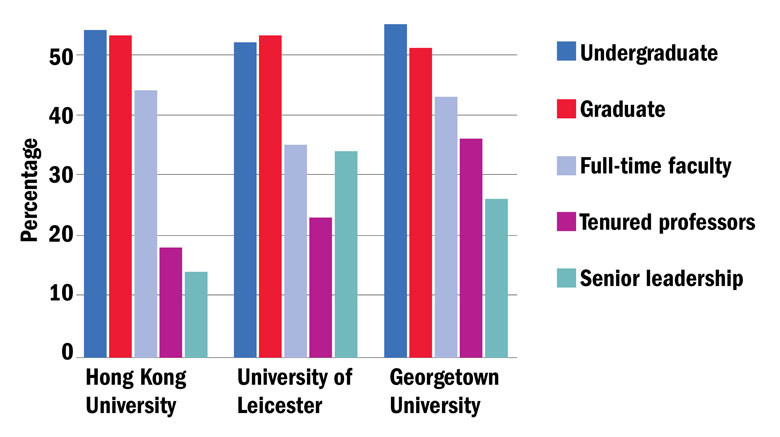The vice-chancellor of the University of Hong Kong (HKU) said that he was “shocked” to discover that some staff at his institution “shrug their shoulders” when it comes to gender inequality.
Peter Mathieson told Times Higher Education that when he joined the university, some staff considered the male-dominated culture within senior positions “too difficult to change” and thought that “we should accept it because there are many other bigger issues to confront”.
“I just didn’t agree with that. I didn’t agree that it wasn’t a big issue, and I didn’t agree that it can’t be tackled,” he said.
He added that he has “tried very hard to increase diversity” when appointing new staff and has “found it very difficult”.
“What shocked me was the attitude of some of the people here, including some senior women involved in those [appointment] processes, just shrugging their shoulders and saying, ‘There is nothing we can do about it; that’s the way it is in Hong Kong,’” he said.
He added that before he was appointed leader of the institution he met the university’s 10 faculty deans and realised that there were “11 men in the room”.
He said these experiences meant that he leapt at the chance to become one of UN Women’s HeForShe IMPACT Universities – a group of 10 institutions spanning eight countries that have made ambitious commitments towards achieving gender equality.
The other institutions are Georgetown University, Stony Brook University, the University of Leicester, the University of Oxford, Nagoya University, the University of São Paulo, Sciences Po, the University of Waterloo and the University of the Witwatersrand.
A report published this week by HeForShe, UN Women’s gender equality campaign, includes figures on female representation among students and academics at each of the 10 universities.
While almost all the institutions have at least 45 per cent female representation at undergraduate level (with the exception of Nagoya University at 29 per cent), the proportion of women in senior leadership and tenured professor positions is between 11 and 38 per cent and 13 and 36 per cent, respectively, according to the University Parity Report.
Female representation among students and academics at three UN HeForShe IMPACT Universities
Source: HeForShe University Parity Report. All figures are from the 2015 academic year
Professor Mathieson admitted that some of the data are “not very pretty” but said that it was refreshing that universities were prepared to publish this information and “applauded” UN Women for “encouraging us to wash our dirty linen in public”.
“It gives us a baseline by which we can measure our progress in the future,” he said.
HKU has committed to trebling the proportion of women in dean-level positions and above, while the other institutions have made similar commitments to closing the gender gap in administrative and academic positions, as well as creating centres of excellence around gender equality and addressing violence against women on campus.
Professor Mathieson said that he made the pledge after 2014 data showed that of the 110 posts at dean level or above in Hong Kong’s eight government-funded universities, just eight were held by women.
He said that Hong Kong employment law means that it is illegal for employers to “discriminate either positively or negatively in favour of any constituent group”, but the university has created a policy requiring at least one woman on all appointment committees and has requested that these committees include at least one woman on all shortlists.
He cited the impact that the Athena SWAN scheme has had on improving gender equality in medical and dental departments in the UK as an inspiring example of an initiative that has created change.
He added that he recently discussed gender equity as part of a debate panel with Scotland’s first minister, Nicola Sturgeon, who was asked a question about meritocracy.
“Her answer, which I thought was brilliant, was: ‘We will know we live in a meritocracy when we have a whole load of undistinguished women in leadership positions.’ I thought that summed it up rather nicely.”
POSTSCRIPT:
Print headline: Hong Kong v-c: staff ‘shrugged’ on gender equity
Register to continue
Why register?
- Registration is free and only takes a moment
- Once registered, you can read 3 articles a month
- Sign up for our newsletter
Subscribe
Or subscribe for unlimited access to:
- Unlimited access to news, views, insights & reviews
- Digital editions
- Digital access to THE’s university and college rankings analysis
Already registered or a current subscriber?








